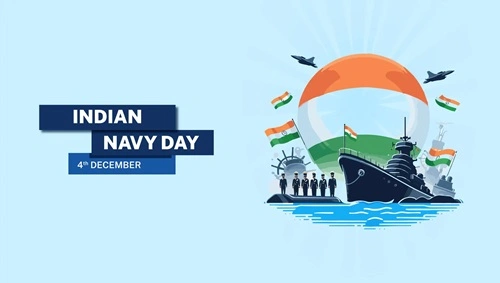Indian Navy Day, observed annually on December 4th, is a day of great pride for every Indian as it celebrates the valor, achievements, and contributions of the Indian Navy. It is a day dedicated to honoring the men and women who serve in the naval forces, ensuring the security of India’s vast maritime borders and playing a crucial role in safeguarding the nation’s interests. The day is a reminder of the sacrifices made by naval personnel and the importance of a strong maritime force for a country like India, with its rich coastline and strategic location.
This article delves into the history, significance, celebrations, and the current role of the Indian Navy, offering an in-depth look at why Navy Day is a matter of national pride.
Why Is Indian Navy Day Celebrated on December 4th?

Indian Navy Day is observed on December 4th to commemorate the success of Operation Trident, a key naval mission during the Indo-Pakistan War of 1971. During this operation, the Indian Navy launched a bold and strategic attack on Pakistan’s port city of Karachi, which housed the country’s naval headquarters.
The operation was a significant success, showcasing the might of the Indian Navy. Using missile boats for the first time, the Indian Navy inflicted heavy damage on the Pakistani Navy, destroying several ships and critical installations while ensuring minimal losses on the Indian side. This decisive victory marked a turning point in the war, highlighting the Indian Navy’s advanced capabilities and strategic thinking.
Since then, December 4th has been celebrated as Indian Navy Day to honor this historic achievement and the sacrifices made by naval personnel.
A Brief History of the Indian Navy
The history of the Indian Navy dates back over 4,000 years to the maritime activities of the Indus Valley Civilization. However, the modern Indian Navy’s roots can be traced to the establishment of the East India Company’s Marine in 1612, which later evolved into the Royal Indian Navy under British rule.
Post-independence, the Royal Indian Navy was renamed the Indian Navy on January 26, 1950, coinciding with India becoming a republic. Since then, the Indian Navy has grown into a formidable force, playing a critical role in safeguarding India’s maritime interests, disaster relief, and international peacekeeping operations.
Significance of Indian Navy Day
Indian Navy Day is more than just a celebration; it is a day of recognition, awareness, and reflection on the vital role played by the naval forces in:
1. Ensuring Maritime Security:
India’s maritime borders stretch over 7,500 kilometers, with access to the Indian Ocean and vital sea lanes. The Indian Navy ensures the security of these waters, preventing threats like piracy, smuggling, and illegal infiltration.
2. Strengthening National Defense:
The Indian Navy serves as the first line of defense during conflicts, securing India’s coastline and offshore assets, including oil rigs and strategic installations.
3. Humanitarian Assistance and Disaster Relief:
The Indian Navy has been at the forefront of disaster relief missions, both domestically and internationally. For instance, during the 2004 Indian Ocean tsunami, the Navy provided immediate assistance and support to affected regions.
4. Showcasing India’s Power Globally:
The Indian Navy participates in joint exercises with other nations, strengthening diplomatic ties and showcasing India’s commitment to peace and security in the Indo-Pacific region.
5. Economic Importance:
The Navy protects India’s sea lanes, ensuring the smooth flow of trade and energy resources, which are crucial for the country’s economic growth.
Celebrations of Indian Navy Day
Indian Navy Day is celebrated with great enthusiasm and patriotic fervor across the country, especially in naval bases, ports, and coastal cities.
1. Naval Displays and Demonstrations:
One of the highlights of Navy Day celebrations is the spectacular Naval Operational Demonstration, showcasing the skills, discipline, and capabilities of the Indian Navy. It includes:
- Naval combat drills.
- Rescue operations.
- Display of advanced warships, submarines, aircraft, and naval technology.
These events offer civilians an opportunity to witness the strength of the Navy and understand its role in national security.
2. Wreath-Laying Ceremonies:
Tributes are paid to the martyrs who sacrificed their lives in service of the nation. Senior naval officers and dignitaries lay wreaths at memorials and hold prayers to honor their contributions.
3. Public Awareness Campaigns:
Various awareness programs, exhibitions, and seminars are organized to educate people about the Indian Navy’s history, achievements, and its vital role in national security.
4. Community Outreach:
The Navy often conducts outreach programs, engaging with schools, colleges, and communities to inspire young Indians to consider careers in the naval forces.
5. Cultural Programs:
Musical and cultural performances, often by naval bands, are organized to celebrate the spirit of the Indian Navy. These programs also include patriotic themes to instill a sense of pride in the audience.
Role of the Indian Navy in Modern Times
The Indian Navy, with its state-of-the-art technology and highly trained personnel, plays a crucial role in securing India’s interests in the 21st century.
1. Strategic Defense:
The Navy protects India’s maritime borders and plays a significant role in securing the Indian Ocean Region (IOR), which is vital for global trade.
2. Blue-Water Navy:
The Indian Navy is classified as a blue-water navy, capable of operating in international waters and projecting power globally. This status highlights its advanced capabilities, from long-range missions to strategic deterrence.
3. Protecting India’s Exclusive Economic Zone (EEZ):
India has an EEZ of over 2 million square kilometers. The Navy ensures the protection of resources within this zone, including fisheries, oil, and gas reserves.
4. International Cooperation:
The Indian Navy regularly participates in joint exercises with countries like the USA, Russia, Japan, Australia, and France. These exercises strengthen diplomatic ties and ensure collective security in the region.
5. Technological Advancements:
With indigenous projects like the INS Vikrant, India’s first homegrown aircraft carrier, and a fleet of advanced submarines, the Navy continues to modernize and expand its capabilities.
Famous Naval Operations
The Indian Navy has been part of several notable operations over the years, showcasing its tactical brilliance and commitment to the nation:
1. Operation Trident (1971): A successful attack on Karachi harbor during the Indo-Pakistan War, commemorated on Navy Day.
2. Operation Cactus (1988): The Navy helped restore order in the Maldives after a coup attempt.
3. Operation Sukoon (2006): A rescue mission to evacuate Indian nationals from Lebanon during the Israel-Lebanon conflict.
4. Operation Rahat (2015): The Navy assisted in the evacuation of Indian and foreign nationals from Yemen during the civil war.
Challenges Faced by the Indian Navy
Despite its remarkable achievements, the Indian Navy faces several challenges:
1. Budget Constraints: The Navy often operates with limited resources, which can hinder modernization efforts.
2. Regional Tensions: The increasing presence of foreign naval forces in the Indian Ocean adds to strategic complexities.
3. Climate Change: Rising sea levels and changing weather patterns affect naval operations and base infrastructure.
4. Piracy and Maritime Crime: The Navy has to address challenges like piracy, illegal fishing, and drug smuggling in the Indian Ocean.
How Can Civilians Support the Navy?
Civilians can contribute to the Navy’s mission by:
- Respecting maritime laws and reporting suspicious activities along coastal regions.
- Encouraging youth to join the Navy and serve the nation.
- Spreading awareness about the Navy’s contributions through social media and community platforms.
Conclusion
Indian Navy Day is not just a celebration of naval strength but also a tribute to the men and women who protect the nation’s maritime borders. It is a day to remember the sacrifices made by our naval personnel, reflect on the importance of maritime security, and inspire future generations to carry forward the legacy of the Indian Navy.
As India moves toward becoming a global superpower, the role of the Indian Navy will only grow in significance. On this Navy Day, let us express our gratitude to the guardians of the seas and pledge to support their endeavors in every possible way.

